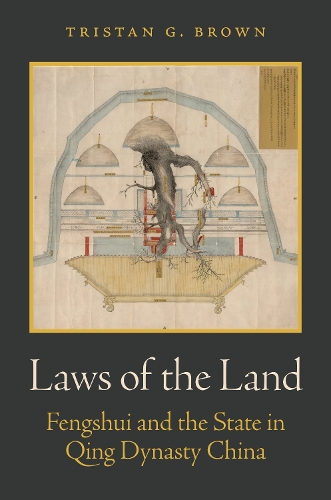
Laws of the Land: Fengshui and the State in Qing Dynasty China
(Paperback)
Available Formats
Publishing Details
Laws of the Land: Fengshui and the State in Qing Dynasty China
By (Author) Tristan G. Brown
Princeton University Press
Princeton University Press
18th March 2026
United States
Classifications
General
Non Fiction
Impact of science and technology on society
History of science
Social and cultural history
Legal history
349.51
Physical Properties
Paperback
356
Width 156mm, Height 235mm
Description
A groundbreaking history of fengshui's roles in public life and law during China's last imperial dynasty
Today the term fengshui, which literally means "wind and water," is recognized around the world. Yet few know exactly what it means, let alone its fascinating history. In Laws of the Land, Tristan Brown tells the story of the important roles-especially legal ones-played by fengshui in Chinese society during China's last imperial dynasty, the Manchu Qing (16441912).
Employing archives from Mainland China and Taiwan that have only recently become available, this is the first book to document fengshui's invocations in Chinese law during the Qing dynasty. Facing a growing population, dwindling natural resources, and an overburdened rural government, judicial administrators across China grappled with disputes and petitions about fengshui in their efforts to sustain forestry, farming, mining, and city planning. Laws of the Land offers a radically new interpretation of these legal arrangements: they worked. An intelligent, considered, and sustained engagement with fengshui on the ground helped the imperial state keep the peace and maintain its legitimacy, especially during the increasingly turbulent decades of the nineteenth century. As the century came to an end, contentious debates over industrialization swept across the bureaucracy, with fengshui invoked by officials and scholars opposed to the establishment of railways, telegraphs, and foreign-owned mines.
Demonstrating that the only way to understand those debates and their profound stakes is to grasp fengshui's longstanding roles in Chinese public life, Laws of the Land rethinks key issues in the history of Chinese law, politics, science, religion, and economics.
Reviews
"Winner of the John K. Fairbank Prize, American Historical Association"
"A Choice Outstanding Academic Title of the Year"
"Winner of the Biannual Book Prize, International Society of Chinese Law and History"
"Laws of the Land is a gripping, overdue study: enlightening, challenging, and utterly inspiring."---Wendy Xiaoxue Sun, Asian Review of Books
"Browns study makes it possible to reconstruct what happened to the Chinese order in the period between the Industrial Revolution, the establishment of the capitalist model of production, and the global development of colonialism. The volume complements and enriches the work of economic historians such as Giovanni Arrighi, Kaoru Sugihara, Bin Wong, and Fernand Braudel." * Journal of Interdisciplinary History of Ideas *
"Excellent . . . Meticulous and fascinating." * Choice *
"With Laws of the Land, Tristan G. Brown fundamentally reframes the debates over fengshui in the Qing. . . . This is an important provocation to historians of Chinese law, religion, and environment, and it should be widely read by students and scholars in those fields and in modern Chinese history more broadly."---Ian M. Miller, Twentieth-Century China
"[Laws of the Land] is carefully, thoughtfully, and elegantly crafted."---Hailian Chen, H-Water
"[Laws of the Land] gives an excellent insight into fngshu during the Qng. . . . [and] offers a fascinating lens into the broader Qng religious landscape: Browns use of legal cases successfully demonstrates the extent to which fngshu, and more broadly popular religion, is deeply and intricately embedded in everyday life."---Joseph Chadwin, Religious Studies Review
Author Bio
Tristan G. Brown is assistant professor of history at the Massachusetts Institute of Technology.
